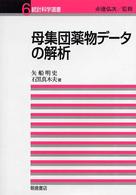- ホーム
- > 洋書
- > ドイツ書
- > Social Sciences, Jurisprudence & Economy
- > Politics, Society, Work
- > social science
Full Description
Besides being a twice-born country - liberated twice, from the British in 1947 and from West Pakistanis in 1971 - it is also an artificial entity suffering from acute crises of culture, development, governance, and identity.








